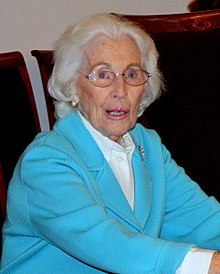| This article needs additional citations for verification. Please help improve this article by adding citations to reliable sources. Unsourced material may be challenged and removed. Find sources: "Hildegard Hamm-Brücher" – news · newspapers · books · scholar · JSTOR (April 2011) (Learn how and when to remove this message) |
You can help expand this article with text translated from the corresponding article in German. (May 2021) Click for important translation instructions.
|

Hildegard Hamm-Brücher (11 May 1921 – 7 December 2016) was a liberal politician in Germany. She held federal state secretary positions from 1969 to 1972 and from 1977 to 1982. She was the Free Democratic Party's candidate in the first two rounds of the federal presidency elections in 1994.
Early life and education
Hamm-Brücher was born in Essen, Germany and grew up with four siblings in a non-political, bourgeois family. Her father was director of an electric firm; her mother maintained the household. Unexpectedly, her parents died within a year of each other when she was only ten and eleven years old. After the death of her parents, along with her siblings, she was brought up by her widowed grandmother in Dresden. Her grandmother came from an industrial family, whose ancestors had converted from Judaism to Protestantism. Hamm-Brücher received her Abitur in 1939 and studied chemistry in Munich. She received her doctorate in chemistry in 1945 and began working as a science journalist for the Neue Zeitung, an American-run newspaper, in what was then still occupied Germany.
Political career
Hamm-Brücher joined the Free Democratic Party in 1948. She was elected to the Munich city council from 1948 to 1954, the Landtag of Bavaria from 1950 to 1966 and again from 1970 to 1976, and the Bundestag from 1976 to 1990. Hamm-Brücher focussed much of her work on education policy, and was appointed as secretary of state to the Hessian and federal Ministry for Education in 1967 and 1969, respectively. She also served as a Minister of State in the German Foreign Office from 1977 to 1982, while her party was part of a coalition government with the Social Democratic Party.
In 1982, the Free Democratic Party left that coalition in order to form a new coalition with the Christian Democratic Union. Rather than holding new elections, the Free Democrats supported a constructive vote of no confidence against Chancellor Helmut Schmidt and in favor of Christian Democrat Helmut Kohl. Hamm-Brücher prominently opposed the new coalition itself, as well as the method of switching coalitions without an election. Subsequently she lost her position as Minister of State, but continued to serve as a member of the parliament until 1990.
Her party nominated her as the Free Democrats' candidate in the German presidential election in 1994. However, the Free Democratic Party, then still in a coalition with the much larger Christian Democratic Union under Chancellor Kohl, ultimately chose to support the Christian Democrat's candidate Roman Herzog in the election's third round. Herzog went on to win the election with the combined majority of Christian and Free Democrats.

In 2002, Hamm-Brücher left the Free Democratic Party after a controversy with Jürgen Möllemann about his election campaign that harshly criticized Ariel Sharon, then Prime Minister of Israel. She served as a Green Party delegate to the Federal Convention for the purpose of electing the President of Germany in 2012.
Hamm-Brücher died on 7 December 2016 at the age of 95.
Other activities
Hamm-Brücher authored several books and articles, often focussing on the state of modern democracy and the relationship between politics and ethical questions. She was a member of the Goethe Institute's biannual General Meeting.
Recognition
- 1992 – Buber Rosenzweig Medal (together with Annemarie Renger)
References
- Mistereck, Wolfgang (1998). Zeltreden (in German). Wallstein Verlag. pp. 265–. ISBN 978-3-89244-322-3. Retrieved 16 April 2011.
- "Als Nachwort zur Präsidentenwahl: Eine FDP-Abgeordnete klagt über ihre Fraktionsspitze: Zum Heulen". Die Zeit (in German). 3 June 1994. ISSN 0044-2070. Retrieved 17 December 2016.
- Burkhardt, Marcel (17 May 2010). "Interview mit Hildegard Hamm-Brücher: "Die SPD ist in der Falle"". Süddeutsche Zeitung (in German). ISSN 0174-4917. Retrieved 10 December 2016.
- Ordentliche Mitglieder der 15. Bundesversammlung Bundestag.
- "FDP-Urgestein: Hildegard Hamm-Brücher ist tot". Spiegel Online (in German). 9 December 2016. Retrieved 10 December 2016.
- "Boards - General Meeting" Goethe-Institut. Retrieved 2016-12-12.
External links
 Media related to Hildegard Hamm-Brücher at Wikimedia Commons
Media related to Hildegard Hamm-Brücher at Wikimedia Commons- Literature by and about Hildegard Hamm-Brücher in the German National Library catalogue
- Grimmer, Claudia (12 May 2016). "Hildegard Hamm-Brücher feiert 95. Geburtstag" (in German). Bayerischer Rundfunk. Archived from the original on 12 May 2016. Retrieved 17 December 2016.
| President: Philipp Jenninger until 11 November 1988; Rita Süssmuth from 11 November 1988 (CDU) | |||||||
| CDU/CSU |
| ||||||
| SPD |
| ||||||
| FDP |
| ||||||
| GRÜNE |
| ||||||
| PDS |
| ||||||
| OTHER |
| ||||||
- 1921 births
- 2016 deaths
- Grand Crosses with Star and Sash of the Order of Merit of the Federal Republic of Germany
- Members of the Bundestag for Bavaria
- Members of the Bundestag 1987–1990
- Members of the Bundestag 1983–1987
- Members of the Bundestag 1980–1983
- Members of the Bundestag 1976–1980
- Members of the Landtag of Bavaria
- Politicians from Essen
- Politicians from the Rhine Province
- Members of the Bundestag for the Free Democratic Party (Germany)